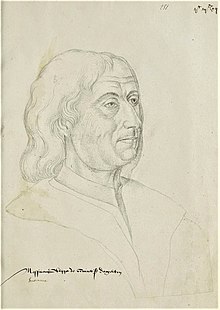Philippe de Commynes
Philippe de Commynes (* around 1447 in Flanders ; † October 18, 1511 at Argenton Castle ) was a French diplomat and historian and an adviser to the kings Louis XI. and Charles VIII . He is considered one of the forerunners of modern historiography and the author of the first French-language memoir in the modern sense.
Life
Commynes was born in Renescure in the county of Flanders (now part of France), which was part of the Duchy of Burgundy , a quasi-independent territory between France and the Holy Roman Empire. He came from a family of officials in the ducal service and came to the court in Brussels as a youth, where he entered the service of the budding Duke Charles the Bold as a squire . Despite his youth, he developed a close relationship of trust with his employer. In 1468 he is said to have successfully prevented Charles, who had become duke in the previous year, from giving the French King Louis XI. to seek after life when he was captured in Péronne in Burgundy.
In 1472, Commynes suddenly turned his back on Duke Karl and switched to the service of his archenemy King Ludwig, which was an outrageous breach of loyalty. Thanks to his intimate knowledge of the person and plans of Charles, he was able to advise the cunning and politically adept Ludwig on his military and diplomatic actions, which were not uninvolved in Charles' defeat and death in 1477.
At the same time, thanks to the contacts that he maintained at the French court with the ambassadors of the various Italian states, he developed into an expert on the conditions there. In 1478 he himself traveled to Turin , Milan and Florence as an ambassador .
As a reward for his services he received larger estates from Louis so that he could marry into the higher nobility .
After the death of Ludwig in 1483, Commynes had difficulties finding a suitable place under his successor Charles VIII or under his older sister Anne de Beaujeu , who was initially reigning . He lost parts of his property and took part in the intrigues of the French nobility against the regent. In the context of the so-called Guerre folle (1488) he was temporarily imprisoned and banned from the court. In this situation he began in 1489 to write his memoirs from the time with Duke Karl and King Ludwig, whom he portrays as princes who deserve to be turned away from or to them, which is why he z. B. also mentions other defectors at the appropriate point and analyzes their motives.
In 1492 Commynes regained access to the courtyard. When King Charles undertook a campaign to Italy in 1494 in order to assert French claims to the crown of the Kingdom of Naples , which had long been considered obsolete , he was sent to Venice as a diplomat . He was supposed to persuade the powerful city-state to remain neutral between France and the rapidly emerging opposing alliance, the "Holy League" from the House of Habsburg, the House of Aragon and the Pope (as ruler of the central Italian papal state). Commynes' mission, however, was unsuccessful. The French had to evacuate Naples and leave Italy for the time being.
Back from Venice , he took up his pen again and wrote the second part (books VII and VIII) of the memoirs from the end of 1495 to the end of 1498, in which he describes his time under Charles VIII, in particular the preparation of the Italian campaign and his activities in Venice. A central motive here seems to be his need to explain his failure there, just as he tried to justify his infidelity to Duke Karl in the first books. Commynes was also very interested in the conditions of existence and motivations of the princes whom he had met, and in general the psychology of the rulers.
The memoirs did not come out until 1524, i.e. posthumously, and were printed under the title Les memoires sur les principaux faicts et gestes de Louis onzieme et de Charles huitieme, son filz, roys de France (Memoirs of the most important acts and deeds of the French kings Louis XI and Charles VIII, his son, kings of France). For a long time they were read as a kind of textbook for politics and (secret) diplomacy and are considered to be the first work of the genre memoir in the modern sense in French literature.
Web links
- Literature by and about Philippe de Commynes in the catalog of the German National Library
- Works by and about Philippe de Commynes in the German Digital Library
- Article "Commynes" in Gert Pinkernell, names, titles and dates of French literature , T. 2 (main source of the article)
| personal data | |
|---|---|
| SURNAME | Commynes, Philippe de |
| BRIEF DESCRIPTION | Burgundian-French historian |
| DATE OF BIRTH | around 1447 |
| PLACE OF BIRTH | Flanders |
| DATE OF DEATH | October 18, 1511 |
| Place of death | Argenton Castle |


